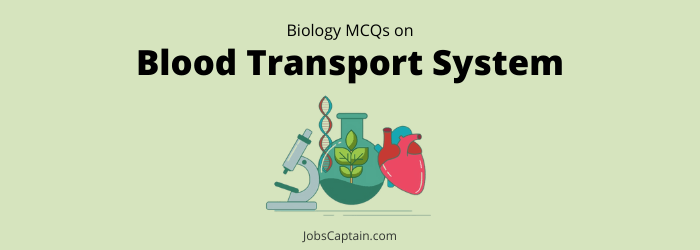
| Quiz Set | 1 | 2 |
Question 1. What is the pH level of blood of a normal person?
(A) 8.25-8.35
(B) 7.35-7.45
(C) 6.45-6.55
(D) 4.5-4.6
Question 2. If the blood group of father is ‘A’ and mother is ‘O’, then what will be the blood group of son?
(A) B, AB or O
(B) O
(C) AB
(D) B
Question 3. A married couple adopted a male child. A few years later, twin boys were born to them. The blood group of the couple is AB positive and O negative. The blood group of the three sons is A positive, B positive and O positive. The blood group of the adopted son is______.
(A) O positive
(B) A positive
(C) B positive
(D) Cannot be determined on the
Question 4. Rh factor derives its name from a type of______.
(A) Rat
(B) Monkey
(C) Human
(D) Ape
Question 5. Blood grouping was discovered by______.
(A) Landsteiner
(B) Robert Koch
(C) William Harvey
(D) Louis Pasteur
Question 6. A person met with an accident and there is no time to check his blood group, which of the following blood should be given to him?
(A) AB, Rh–
(B) O, Rh–
(C) O, Rh+
(D) AB, Rh+
Question 7. A man whose blood group is not known meets with a serious accident and needs blood transfusion immediately. Which one of the blood groups mentioned below and readily available in the hospital will be safe for transfusion?
(A) AB, Rh+
(B) AB, Rh–
(C) O, Rh+
(D) O, Rh–
Question 8. A person meets with an accident and needs a blood transfusion but there is no time to check his blood group. Which of the following blood groups could be given to him?
(A) AB–
(B) AB+
(C) O–
(D) O+
Question 9. A person with ‘AB’ blood group is sometimes called a universal recipient because of the_____.
(A) Presence of antibodies in his blood
(B) Lack of both antigens and antibodies in his blood
(C) Lack of antibodies in his blood
(D) Lack of antigen in his blood
Question 10. Blood group AB can accept blood from a person which blood group?
(A) Only A
(B) Only AB
(C) Only B
(D) Any group
Question 11. For human blood transfusion, which blood group is known as a universal donor?
(A) A+ Group
(B) AB Group
(C) O Group
(D) B+ Group
Question 12. The blood pressure in our body is______.
(A) Lesser than the atmospheric pressure
(B) Equal to the atmospheric pressure
(C) Greater than the atmospheric pressure
(D) None of the above
Question 13. Blood pressure of four persons gives belongs.
- Mrs. (X) – 90/60
- Mr. (X) – 160/120
- Mr. (Y) – 120/80
- Mrs. (Y) – 140/100
Whose blood pressure is normal in the following?
(A) Mrs. (Y)
(B) Mr. (Y)
(C) Mr. (X)
(D) Mrs. (X)
Question 14. When a person becomes older, his blood pressure generally______.
(A) Varies widely
(B) Remains the same
(C) Increases
(D) Decreases
Question 15. The blood pressure of an individual is 140 mm Hg. In this statement, ‘Hg’ refers to______.
(A) Heliograph
(B) Hygrometer
(C) Mercury
(D) Hydrogen
Question 16. Which of the following instrument is used for measuring blood pressure?
(A) Sphygmomanometer
(B) Salinometer
(C) Multimeter
(D) Hydrometer
Question 17. The blood pressure (systolic and diastolic) of a healthy man is______.
(A) 85 mm and 55 mm
(B) 90 mm and 60 mm
(C) 201 mm and 110 mm
(D) 120 mm and 80 mm
Question 18. Average blood pressure of a human is______.
(A) 120/80
(B) 60/140
(C) 20/80
(D) 60/100
Question 19. What function does blood perform in the body?
(A) Helps in erection
(B) Helps in digestion
(C) Maintains liquidity
(D) Takes oxygen to all parts
Question 20. Red Blood Corpuscles (RBCs) has colour due to______.
(A) Haemoglobin
(B) Haemocynin
(C) Chlorophyll
(D) Cutin
Question 21. Due to which the blood has red colour?
(A) W.B.C.
(B) Haemocynin
(C) Haemoglobin
(D) Plasma
Question 22. What is haemoglobin?
(A) Secretion coming out from the pituitary gland
(B) Substance found in human blood
(C) Substance found in the bone marrow
(D) Substance found in the leaves of plants
Question 23. Blood is_____.
(A) Connective tissue
(B) Both of the above
(C) Epithelial tissue
(D) None of the above
Question 24. In which of the following creatures haemoglobin is dissolved in protoplasm?
(A) Earthworm
(B) Human
(C) Fish
(D) Frog
Question 25. The function of haemoglobin in body is______.
(A) Utilization of Iron
(B) Prevention of Anaemia
(C) Destruction of Bacteria
(D) Transport of Oxygen
Question 26. The pH value of blood is______.
(A) 8.0
(B) 7.4
(C) 6.4
(D) 5.0
Question 27. An antigen is a substance which_______.
(A) Stimulates formation of antibody
(B) Lowers body temperature
(C) Is used to treat poisoning
(D) Destroys harmful bacteria
| Quiz Set | 1 | 2 |
